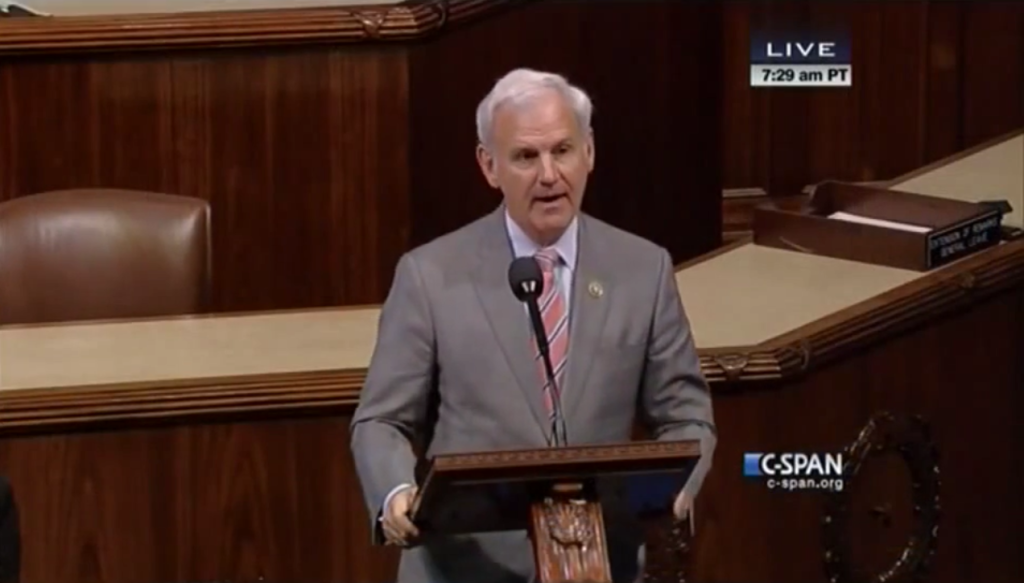August Recess: What your Member of Congress has been up to

It’s August, and that means the Alabama Delegation has been back home in the Yellowhammer state for August Recess, and will pick up business in Washington, D.C. after Labor Day. But don’t let the name fool you, the “recess” is designed to give members of Congress an opportunity to reconnect with the constituents they represent. Here’s a quick peek at what the Alabama Delegation has been up to during August Recess: U.S. Sen. Jeff Sessions: Sen. Sessions stopped by to meet with workers at the Honda plant in Lincoln. Sen. Sessions visited the Army Reserve Building in Gordo. U.S. Sen. Richard Shelby: Joined Tuscaloosa Mayor Walter Maddox and HUD Secretary Julián Castro on a tour of recovery sites in Tuscaloosa impacted by the 2011 tornado. U.S. Rep. Bradley Byrne (AL-01): Ag Matters tour with a stop in Brewton to visit with some local foresters. Organized the Women’s Forum in downtown Mobile. 100 women attended. Held an Education and the Workforce Committee field hearing to discuss the National Labor Relations Board’s interpretation of a “joint employer.” Visited the National Naval Aviation Museum at Naval Air Station Pensacola to learn more about our nation’s airmen and the important work they do. U.S. Rep. Martha Roby (AL-02): Visited with the honors junior and senior classes at Ariton High School. Visited the Pike County Economic Development Corporation. Visited Barbour County. U.S. Rep. Mike Rogers (AL-03): “Congress on Your Corner” event in Ashland. “Congress on Your Corner” event in Wedowee. “Congress on Your Corner” event at the Russell County Courthouse in Phenix City. U.S. Rep. Robert Aderholt (AL-04): Visited Corinth West Methodist Church in Cullman County for their annual singing. Got the chance to drive the car around the track at the Talladega Superspeedway. U.S. Mo Brooks (AL-05): Visited with the Jackson County chapter of the National Active and Retired Federal Employees Association (NARFE) in Scottsboro. Town Hall meeting in Decatur. Met with the Athens Limestone Association of Realtors. U.S. Rep. Gary Palmer (AL-06): Visited the State Farm Insurance Birmingham Operations Center. Visited the Home Depot store in Pelham. Joined the people of the Pelham Police Department and the Pelham Fire Department for lunch. Spoke at the Trussville Area Chamber of Commerce. U.S. Rep. Terri Sewell (AL-07): Met with Rep. Aderholt, Bryan Kindred the CEO of DCH and Keith Parrott. Welcomed the U.S. Secretary of Agriculture Tom Vilsack for a tour of the 7th Congressional District. Toured the Selma site of the Innovative Readiness Training Healthcare Clinic. Spoke to Educators at Choctaw County School system.
Florida’s Gus Bilirakis to energy conference: I’ll fight “tooth and nail” against EPA overreach

U.S. Rep. Gus Bilirakis addressed a group of energy industry executives and representatives Wednesday in Tampa. 2015 Gulf Coast Energy Forum attendees spent the better part of the morning and afternoon railing against the Obama administration’s EPA and its new proposed regulations to rein in coal-fired power plants before the fifth-term Republican congressman arrived to give the closing remarks. His message: I’m with you. “While we should strive to protect our earth – God’s creation – that goal does not need to be achieved through harsh EPA regulations that increase every constituent’s cost of living” said Bilirakis. “Sadly the Obama administration’s proposed Clean Power Plan is a prime example of a harmful disconnect.” Bilirakis, a member of the House Energy & Commerce Subcommittee, inveighed against the new proposed rules designed to reduce greenhouse gases and air pollution by requiring steep numerical decreases in harmful emissions. “The plan sets unrealistic expectations for carbon dioxide and methane emissions that are already being significantly, and appropriately, curtailed,” said Bilirakis, who represents Florida’s 12th Congressional District. “The new requirements will likely lead to industry adjustments that will naturally lead to higher electricity costs for consumers.” Contra the new federal regulations, Bilirakis pointed to two pieces of legislation passed by the House which await a hearing by the more Democratic-leaning Senate. The “Ratepayer Protection Act” – HR 2042, passed by the House in June – was one remedy prescribed by Bilirakis, of which he was one of 67 co-sponsors. Five of Alabama’s seven House delegates also cosigned the measure: Republicans Mo Brooks, Bradley Byrne, Martha Roby and Mike Rogers plus Democrat Terri Sewell. The entire delegation voted in favor of the bill, which sailed to passage 247-180. “The law allows for the completion of judicial review of any final rule before requiring states to comply with a costly rule,” the Tarpon Springs native explained. By passing the bill, “We are simply protecting families and businesses from significant electricity rate increases or reduced reliability when the rules are not on sound legal ground, or fail to take into account as consequences.” Bilirakis also gestured towards the Architecture of Abundance Act, a multi-year iterative effort by Republicans on the Energy & Commerce Committee that the panel’s website describes as a replacement for “outdated policies rooted in the old ideas of energy scarcity.” Bilirakis drew the approval of one lineman in the crowd who “raised the roof” as he vowed to stand fast against federal meddling in the energy industry. “I promise to keep fighting tooth and nail in Washington, D.C. to make sure the harmful effects of this administration’s proposed rules are not realized.”
Bradley Byrne: Lessons from Israel

Ronald Reagan once said that the friendship between the United States and Israel is “based on historic moral and strategic ties, as well as our shared dedication to democracy.” With that in mind, I recently traveled to Israel with a Congressional delegation in an effort to strengthen the partnership between our two countries. Throughout the trip, we met with top Israeli officials, including Prime Minister Benjamin Netanyahu and President Reuven Rivlin. We also met with members of the Israel Defense Forces, the opposition leader, leaders from the Palestinian Authority, local historians, and Israeli business officials. I was especially impressed by the Israel Defense Forces and their commitment to defending their country. I had the opportunity to visit with young men and women who serve in the IDF during a luncheon near the Gaza Strip. I have no doubt in the ability of these individuals to stand up against the radical terrorists who continue to attack Israel. We were also able to get a firsthand look at the Iron Dome technology, which is the air defense system designed to intercept short-range rockets and artillery developed jointly between the U.S. and Israel. The system was very effective during last year’s conflict between Israel and Hamas. There are a number of Iron Dome sites set up all across Israel that have saved thousands of Israeli lives, and I am proud the United States helped make this technology possible. We also traveled to the Golan Heights in the northern part of Israel near the border with Syria. From there, we viewed some of the territory claimed by the Islamic State. Israel is in an impossible position, under attack from literally all sides, with a major Islamic terrorist organization and a country experiencing civil war just miles from its border. As you may expect, much of our trip focused on the proposed nuclear agreement between the United States and Iran. Israeli officials, including Prime Minister Netanyahu, expressed serious concerns that Iran will use the $150 billion in sanctions relief to fund terrorist organizations like Hamas and Hezbollah, who have repeatedly attacked Israel. We can’t forget that Iran is the foremost state sponsor of terrorism in the world, and it does not make sense to give them access to billions of dollars in frozen Iranian assets. I knew before I visited Israel that the Iran nuclear deal was bad for the American people, but this trip has further reinforced my concerns. I will certainly oppose the Iran nuclear agreement when it comes before Congress for a vote, and I will work to convince my colleagues to do the same. All political and national security issues aside, Israel is also home to a number of historical and holy sites. As a Christian, it was very powerful to travel in the area where Jesus once walked. I had the opportunity to pray at the Western Wall, which is the western wall of the Temple Mount in Jerusalem. We also visited the Sea of Galilee, the Mount of Beatitudes where Jesus delivered the Sermon on the Mount, and the Church of the Nativity in Bethlehem where Mary lay the Baby Jesus in the manger. So as President Reagan said, there are clear political, security, and cultural ties between the United States and Israel, and now is certainly not the time to be turning our back to Israel. I made sure to tell all the Israeli people I talked to that the United States is going to continue to stand strong with Israel against the violent extremists who threaten their way of life. Bradley Byrne is a member of the U.S. Congress representing Alabama’s 1st Congressional District.
Alabama Delegation: August Recess schedule 2015

It’s August, and that means the Alabama Delegation has put business on hold in Washington, D.C. until after Labor Day and has made its way back to the Yellowhammer state for August Recess. While it sounds like vacation, the “recess” is actually designed to give members of Congress an opportunity to reconnect with the constituents they represent, and travel to places across the globe relevant to legislation in Congress, and to strengthen U.S. relations in those countries. Here’s what the Alabama Delegation is up to this August: Rep. Bradley Byrne (AL-01): Congressman Byrne is currently in Israel with a group of Congressmen working to strengthen relations between the U.S. and Israel. Monday, August 17, 2015 9:00 a.m: Solutions Tour Town Hall Meeting at the Poarch Creek Indian Reservation, Tribal Auditorium 11:00 a.m.:Solutions Tour Town Hall Meeting at the Pollard, Town Hall 1:30 p.m.:Solutions Tour Town Hall Meeting at the Brewton, City Hall 3:00 p.m.: Solutions Tour Town Hall Meeting at theEast Brewton, City Hall Tuesday, August 18, 2015 9:00 a.m.:Solutions Tour Town Hall Meeting at the Chatom, Town Hall 10:30 a.m.:Solutions Tour Town Hall Meeting at the Millry, Town Hall 1:30 p.m.:Solutions Tour Town Hall Meeting at the Grove Hill, Town Hall 3:00 p.m.:Solutions Tour Town Hall Meeting at the Jackson, Senior Center Wednesday, August 19, 2015 9:00 a.m.: Solutions Tour Town Hall Meeting at the Bayou La Batre, City Hall 11:00 a.m.: Solutions Tour Town Hall Meeting at the Dauphin Island, Town Hall 2:30 p.m.: Solutions Tour Town Hall Meeting at the Chickasaw, City Hall 4:30 p.m.: Solutions Tour Town Hall Meeting at the Mobile/Maysville Community, Williamson High School Friday, August 21, 2015 9:00 a.m.:Solutions Tour Town Hall Meeting at the Bay Minette, City Hall 11:00 a.m.:Solutions Tour Town Hall Meeting at the Loxley, Town Hall 2:00 p.m.:Solutions Tour Town Hall Meeting at the Elberta, Town Hall Thursday, August 27, 2015 5:30 p.m.: Solutions Tour Town Hall Meeting at the Monroeville, City Hall Rep. Mo Brooks (AL-05): Thursday, August 13, 2015 7:00 p.m.: Athens Town Hall Meeting: Athens State University, Sandridge Center Ballroom Wednesday, August 26, 2015 8:30 a.m.: Women’s Conference at the Battle House Hotel in Mobile Rep. Gary Palmer (AL-06): Congressman Palmer is currently in Israel with a group of Congressmen working to strengthen relations between the U.S. and Israel. Alabama Today will continue to update the August Recess schedule, so be sure to come back for updates.
Bradley Byrne: Reforming and reducing federal spending

At this very moment, the national debt sits at over $18 trillion dollars, and it shows no signs of going down anytime soon. Our spending problems are reaching crisis level, and we are set to leave behind a catastrophe for the next generation. Take my grandson MacGuire for example. Before his first birthday, his share of the national debt is already over $40,000. We cannot turn a blind eye to this problem and pretend that it will just get better. Congress must get serious about reining in spending. As you may know, there are two basic types of federal spending: mandatory and discretionary. Discretionary spending is what most people think of as essential government functions. This is money that goes to things like our military, highways, national parks, agriculture, and medical research. The good thing about discretionary spending is that each year Congress has the ability to set these spending levels through the appropriations process. Discretionary spending has become a smaller and smaller portion of the federal budget over the last few decades. In fact, it now makes up only around one-third of all federal spending. Mandatory spending, along with the interest on the debt, makes up the other two-thirds of the federal budget. However, unlike discretionary spending, mandatory spending does not require an annual appropriation from Congress. As long as someone meets the requirements, these programs dole out money without any action from Congress. Within mandatory spending are what we call means based entitlement programs. This includes programs like Medicaid, Obamacare, food stamps, and other welfare programs. While some of these programs serve an important purpose, there are serious questions about their effectiveness as costs skyrocket. In Fiscal Year 2012 alone, the federal government spent almost $800 billion on over 92 various programs aimed at lifting Americans out of poverty. Despite that record spending, too many Americans simply stopped looking for work. The system is clearly failing the very people it was designed to help. It is not a surprise that spending on these programs increased during the recent economic downturn, but it is surprising that spending on these programs continues to rise even as the economy improves. I fear that these programs are actually driving up the national debt and fueling a dangerous cycle of government dependence. I believe we must reform these programs and put a real focus on job training to help connect Americans with the skills they need to find work. We could block grant money to the state governments each year and allow individual states to craft poverty fighting programs based on their state’s specific societal and economic needs. Why is it so critical we get mandatory spending under control? In 1965, only 34% of the federal budget was consumed by mandatory spending programs. In 2014, over 66% of the budget was made up of mandatory spending. Without action, the Congressional Budget Office estimates that by 2040, over 75% of federal spending will be on auto-pilot. That would leave only 25% of the budget to go towards some of the federal governments most basic responsibilities, like providing for the common defense. I know that reforming these programs will not be easy, but I did not run for Congress to make easy decisions. Before I leave Congress, I want to be able to look my grandson MacGuire in the eyes and know that I have been a part of a real effort to rein in spending and put our nation on a fiscally stable path for the next generation. I hope my colleagues will join me in addressing our nation’s spending crisis and working toward a better future for the next generation. Bradley Byrne is a member of the U.S. Congress representing Alabama’s 1st Congressional District.
Email Insights: Bradley Byrne highlights federal spending crisis

U.S. Rep. Bradley Byrne took to the floor of the U.S. House of Representatives Tuesday to deliver a speech on how out-of-control federal spending is reaching crisis level and could result in a catastrophe for the next generation. In an email Tuesday afternoon, Byrne released the following video of his speech where he talked specifically about means based entitlement programs, including Medicaid, Obamacare, food stamps, among other welfare programs, noting spending within these programs has ballooned in recent years, despite improvements in the economy. We have reached a point where we must get serious about reining in our out-of-control spending or else we may fall victim to a similar fate that many nations throughout history have experienced. A full transcript of the video can be found below. Mr. Speaker, I rise this morning to talk about one of the biggest problems facing our nation – out-of-control spending. At this very moment the national debt sits at over $18 trillion dollars. We have not arrived at this point because of the actions of one party or one administration. Over the years, both parties have enacted programs that increased our debt. That said, we have reached a point where we must get serious about reining in our out-of-control spending or else we may fall victim to a similar fate that many nations throughout history have experienced. Here in the United States, our spending problems are reaching crisis level, and we are effectively leaving behind a catastrophe for the next generation. The basis of the American dream is that if you work hard, you can leave behind a better future for your children and grandchildren. That fundamentally American vision is in jeopardy due in part to our irresponsible spending. I am a new and very proud grandfather. My grandson, MacGuire, is about to turn one and already his share of the national debt – before his first birthday – is over $40,000. We cannot turn a blind eye to this problem and pretend that it will just get better. Let me explain why. There are two basic forms of federal spending: mandatory spending and discretionary spending. Mr. Speaker, when most people think of the federal government, they are probably thinking about discretionary programs. This is money that goes to things like our military, highways, national parks, agriculture, and medical research. The good thing about discretionary spending is that each year Congress has the ability to control these spending levels through the appropriations process. Since Republicans took control of the House in 2010, we have had some success in cutting funding to various federal agencies. For example, agencies like the IRS and EPA have seen their budgets cut in response to egregious executive overreach. While it may seem like it covers the majority of government operations, discretionary spending actually only makes up about one third of all federal spending. The other portion is what we call mandatory spending. This, along with the interest on the national debt, makes up almost two thirds of all federal spending. Now here’s the really bad part about mandatory spending: it is on auto-pilot. Unlike discretionary spending, mandatory spending does not require annual appropriations from Congress. Instead, as long as someone meets the requirements, these programs dole out money without any action from Congress. Within these mandatory spending programs are what we call means based entitlement programs, including things like Medicaid, Obamacare, food stamps, welfare, and the like. For example, in Fiscal Year 2012, the federal government spent almost $800 billion on over 92 programs aimed at lifting Americans out of poverty. Despite that record spending, too many Americans simply stopped looking for work. The system is failing the very people it was designed to help. While many of these means based entitlement programs have good intentions, they aren’t supposed to be permanent. These programs were created to help lift people out of poverty, not keep them there. That’s why it shouldn’t be a surprise that during the recent economic downturn spending on these means based entitlement programs ballooned. What is surprising however is that as the economy has improved, the spending on these programs has not gone down. In fact, spending on some of these programs remains at all-time highs. Now, Republicans and Democrats both agree that Americans shouldn’t be stuck in poverty, and that’s why we should put party politics aside and come together to address this dangerous cycle of government dependence. We need to reform these means based entitlement programs to put a real focus on workforce training to help connect Americans with the skills they need to get a good paying job that meets workforce demands. We could block grant, through the appropriations process, money to the state governments and allow them to craft poverty fighting programs based on their state’s specific societal problems and economic needs. Now, Mr. Speaker, I know that reforming these mandatory spending programs won’t be easy, but I didn’t run for Congress to come up here and make easy decisions. I doubt my colleagues did either. Before I leave this body, I want to be able to look at my grandson MacGuire and know that I have been a part of a real effort to rein in spending and put our nation on a fiscally stable path for the next generation. We won’t be able to make any real progress toward that goal without serious reforms to these means based entitlement programs. That is what is driving our debt, and we cannot keep looking the other way as the national debt skyrockets. So, Mr. Speaker, I call on my colleagues to join me in addressing our nation’s spending crisis. Let’s come together and make the tough choices, let’s get our spending under control, and let’s leave behind a better America for the next generation.”
U.S. House of Representatives: July 27-31

The U.S. House of Representatives came back in session Monday for its final week before a month-long August recess. On Monday, the House is in session and will consider a whopping 17 bills under suspension of the rules. Over half of these bills come from the Homeland Security Committee. A full list of bills can be found here. While not a part of the official House schedule this week, looming in the legislative shadows of Capitol Hill is the pending expiration of federal highway programs and funding. Two weeks ago, the House of Representatives passed an extension bill to provide highway funding through Dec. 18 in order to provide more time for the two chambers to come to an agreement on a full highway bill. However, last week and over the weekend, the Senate took under consideration a multiyear highway bill, putting the upper chamber at odds with the lower chamber as the debate over how to extend funding for the program, and for how long persists. The current authorization expires on Friday. Other legislation on the floor for a vote this week includes: H.R. 427: the Regulations from the Executive in Need of Scrutiny (REINS) Act. This bill aims to increase transparency in the federal regulatory process. The bill would modify the federal rule-making process by preventing “major rules” — those generally having an annual economic impact greater than $100 million — from being implemented unless Congress enacts legislation approving them. This legislation passed the House previously both in 2011 and 2013, but has no chance to pass the Senate and is strongly opposed by President Obama. Alabama co-sponsors: Rep. Bradley Byrne (AL-1), Rep. Martha Roby (AL-2), Rep. Mike Rogers (AL-03) Rep. Mo Brooks (AL-5) H.R. 1994: the VA Accountability Act. The bill expands the ability of the Veterans Affairs (VA) Department to fire or demote VA employees based on performance or misconduct. It also includes provisions to protect VA whistleblowers against retaliation by supervisors Alabama co-sponsors: Rep. Martha Roby (AL-02) H.R. __: VA Budget and Choice Improvement Act. This legislation has yet to be assigned a bill number, but is written to address a $2.5 billion gap in the VA budget. The shortfall is the result of higher-than-anticipated demand for veterans health services and a lack of flexibility to shift money within the overall VA budget, according to the VA. To cover the gap, the VA has asked Congress to allow the VA to divert $3 billion from the “Choice Program,” an emergency fund set up in the wake of last year’s wait-times scandal to subsidize non-VA care for veterans and help reduce the time it takes to get medical appointments. FY2016 National Defense Authorization Act (NDAA). While not officially on the schedule, there has been time set aside to consider a potential conference report that House and Senate conferees are currently working on as differences in the two chambers respective NDAAs remain unresolved.
Bradley Byrne: We must stand up for life

As the proud father of four children (and a new grandfather), I have great appreciation for the value of a human life. Every child deserves the opportunity to live a long and prosperous life. That’s why I was so angered by a recent video in which abortion doctors from Planned Parenthood talked casually about harvesting and selling the body parts of aborted babies. In one video, Planned Parenthood’s senior director of medical services talks about how she “crushes” babies in certain ways in order to preserve organs that can then be sold. She mentions how some body parts are worth more money than others. She talks about these distressing topics while casually enjoying her lunch. Just last week, another video was released. In this video, a different Planned Parenthood official discussed the various price options for which the organization would sell fetal body parts. When asked if the price was too low, the Planned Parenthood official responded by saying that she wanted to be able to buy “a Lamborghini.” Let’s be clear: the loss of any human life is a tragedy. Even worse, the casual nature in which the Planned Parenthood officials talk about taking a human life is heartbreaking and appalling. As a parent, but more importantly as an American, these videos make my blood boil. This is not only an emotional debate. In fact, there are also serious legal questions surrounding Planned Parenthood’s actions. Section 42 U.S.C. 289g-2(a) of the federal code makes it unlawful for any person “to knowingly acquire, receive, or otherwise transfer any fetal tissue for valuable consideration if the transfer affects interstate commerce.” In other words, it is against the law to buy or sell fetal tissue in an effort to make a profit. Congress cannot simply sit on the sidelines and wait for someone else to respond. These egregious actions require a response, and I believe Congress should act swiftly to prevent this kind of behavior from occurring in the future. Planned Parenthood receives far too much money from the federal government. Already this year, Planned Parenthood has received almost $46 million in federal grants. Since 2012, Planned Parenthood has banked over $200 million in federal funding. With that in mind, I co-sponsored important legislation designed to eliminate all federal funding for Planned Parenthood. I am a proud co-sponsor of H.R. 3134, the Defund Planned Parenthood Act of 2015. This bill would place a moratorium on all sources of federal funding to Planned Parenthood, including federal grants. I do not think we should stop with just Planned Parenthood though. That’s why earlier this year I voted for H.R. 7, the No Taxpayer Funding for Abortion Act of 2015. This straightforward bill would prohibit federal funding from being used for abortion except in the case of rape, incest, or where the health of the mother is at risk. The House Energy and Commerce Committee and the House Judiciary Committee have already launched investigations into Planned Parenthood, and I applaud them for wasting no time in getting to the bottom of this situation. Congress should not be the only ones launching an investigation. I recently signed a letter to the Justice Department calling for a full federal investigation into Planned Parenthood as it relates to the harvesting and selling of fetal body parts. If the law was broken, then those responsible should be prosecuted to the fullest extent of the law. You can rest assured that I am going to continue to look into this situation and support pro-life policies during my time in Congress. Every single life is precious and worth the fight. Bradley Byrne is a member of the U.S. Congress representing Alabama’s 1st Congressional District.
U.S. House of Representatives: July 20-24

The U.S. House of Representatives returns Tuesday to tackle a very light legislative load now that House Leadership has canned the Interior Appropriations and patent reform bills from the floor schedule this week. Tuesday the House is in session and will consider four noncontroversial bills under suspension of the rules. A full list of bills that will be considered can be found here. Other legislation on the floor for a vote this week includes: H.R. 1734: the Improving Coal Combustion Residuals Regulation Act. The bill establishes minimum federal standards regarding the disposal and storage of coal combustion residuals. Alabama co-sponsors: Rep. Bradley Byrne (AL-1), Rep. Mike Rogers (AL-3) H.R. 1599: the Safe and Accurate Food Labeling Act. The bill would require a national standard for labeling laws related to genetically-modified organisms (GMOs) in foods It would pre-empt any related state and local laws and prohibit mandatory labeling of GMO or non-GMO foods. Alabama co-sponsors: Rep. Bradley Byrne (AL-1), Rep. Mike Rogers (AL-3), Rep. Mo Brooks (AL-5)
Alabama’s congressional delegation reacts to Iran nuclear deal

After ongoing talks that spanned 20 months, a deal aimed at reining in Iran’s nuclear program was announced Tuesday by President Barack Obama. Led by the United States, Iran and a group of six other nations agreed to significantly limit Tehran’s nuclear ability for more than a decade with the goal of easing global fears of a nuclear-armed Iran threatening the Middle East. In return, Iran would get billions of dollars in relief from lifting international oil and financial sanctions. Congress has some say in the future of this deal. The Associated Press reports Congress has a 60-day review period “during which Obama cannot make good on any concessions to the Iranians. U.S. lawmakers could hold a vote of disapproval and take further action.” Here are reactions from the Alabama delegation to the announced nuclear agreement between the United States, Iran, France, China, United Kingdom, Russia. We will be updating this post as they come in: U.S. Sen. Richard Shelby: Today’s announced nuclear agreement with Iran is a bad deal for the American people. For the past several months, I have been concerned that President Obama was chasing a deal with Iran just for the sake of reaching an agreement. This deal wrongly prioritizes Iran’s objectives rather than the goal of the United States: to end Iran’s nuclear program. U.S. Rep. Bradley Byrne (AL-01): From the start of these talks I have warned that President Obama and his negotiating team were desperate for a foreign policy victory, and I fear the safety of Americans and our allies in the Middle East will be at greater risk because of this deal. Iran is no friend of the United States, and we should all be concerned about what they will do with billions of dollars in sanctions relief. Even Joint Chiefs of Staff Chairman General Martin Dempsey has stated that sanctions relief would allow Iran to send more money to terrorist groups in the Middle East. Congress will now have an opportunity to closely scrutinize and vote on this agreement, and I call on my colleagues to look past the short-term rhetoric and instead focus on the long-term implications this deal could have on our national security and the safety of our allies abroad. U.S. Rep. Martha Roby (AL-02): We’ve known for weeks now that Secretary Kerry and negotiators have been back-peddling, but I had hoped that by speaking out we could encourage them to strengthen their adherence to American interests. Unfortunately, that hasn’t worked. The Obama Administration has insisted for years that Iran does not have a right to enrich uranium and that any lifting of sanctions would come with requiring Iran to acknowledge and dismantle their nuclear weapon program. What was announced today fails to meet even those basic objectives, and Americans should be very disappointed that President Obama and Secretary Kerry abandoned their own goals to strike a deal with Iran. More broadly, I fear this deal will work to aggravate an already dangerous and volatile region. It’s no secret that Iran is the world’s foremost state sponsor of terrorism. I fear this deal will only embolden those efforts with little more than hope that they’ll change their ways. Today, Iran’s decades of hostility and deception has been rewarded with a plum deal that ensures they’ll have a nuclear weapon before long. The message that sends to other rogue nations is dangerous and alarming. Congress has 60 days to review this deal and render its judgment. We must use this time to inspect this agreement carefully and judge it based on what was promised to Congress and to the American people. I believe my colleagues on both sides of the aisle must prepare to stand up and assert our authority to stop a potentially bad deal from going forward on behalf of the American people. U.S. Rep. Mike Rogers (AL-03): I was very disappointed in today’s announcement of the Iran nuclear deal. Iran is a state that cannot be trusted and this deal rewards bad behavior while compromising our national and global security. I am completely opposed to this deal. U.S. Rep. Robert Aderholt (AL-04) via Facebook: I am skeptical on the #IranDeal + fear lifted sanctions will fund instability in the Middle East. As the saying goes, the devil will be in the details #transparency #verification U.S. Rep. Terri Sewell (AL-07): I commend the efforts of President Obama, Secretary Kerry, Secretary Moniz and their team in securing a diplomatic agreement with Iran on its nuclear program. To be sure, it is not in the interest of the United States or its allies for Iran to ever develop a nuclear weapon. I agree with President Obama that no deal is better than a bad deal and it is through that prism that I will thoroughly review and evaluate this agreement. We cannot sign any agreement with Iran based on trust, nor should sanctions be loosed unless Iran meets its obligations and such compliance can be verified. We must remain ever vigilant in our insistence that Iran never reaches nuclear capability.
Bradley Byrne: BP settlement a missed opportunity

Whether you are from Brewton, Frisco City, or Robertsdale, you probably remember the summer of 2010 and the BP oil spill. The scenes on our Alabama beaches were heartbreaking as oil glistened in the water and tarballs washed ashore. From the waitress at the restaurant in Atmore to the gas station owner in Loxley, families and small businesses from throughout Southwest Alabama were negatively impacted by the lack of tourism. Many parts of our area are still dealing with economic and environmental challenges brought on by the oil spill. That’s why I was cautiously optimistic when I learned the Department of Justice and the five Gulf States had reached a settlement agreement with BP to cover penalties and damages associated with the oil spill. The total settlement was worth $18.7 billion, making it the largest settlement ever between the United States and a single company. Unfortunately, as my staff and I began to look into the details of the settlement, we realized that Alabama’s coastal communities were getting a bad deal. Only around $1.8 billion of the total settlement would be directly spent in Alabama. Even worse, over half of the money is slated to go directly into the state’s General Fund instead of flowing to our coastal areas. Now I understand that the State of Alabama is currently in the midst of a budget crunch, but I do not believe money from a natural disaster on the Gulf Coast should be used to fix a man-made “disaster” in Montgomery. That money should be allocated for projects which meet the needs of Coastal Alabama. Just as bad, too much of the total settlement money is going to be under the control of federal regulators in Washington, like NOAA – the same federal agency that is responsible for our drastically shortened Red Snapper season. I certainly don’t trust NOAA and other agencies from the Obama administration with the settlement money. Here’s why this is so frustrating. In 2012, Congress, led by Gulf Coast congressmen like Alabama’s own Jo Bonner, passed the RESTORE Act. This landmark legislation created a clear framework to ensure that money from any BP settlement would flow directly to communities on the Gulf Coast. The RESTORE Act specifically guaranteed local decision makers would control how the money was spent. The bill created the RESTORE Act Council, including local officials from Baldwin and Mobile counties, which would allocate the funds toward projects of particular need. Sadly, instead of directing money toward the RESTORE Act process, the settlement puts money toward the Natural Resources Damages Assessment (NRDA) program. This program is governed by a board of trustees that includes too much influence from the federal government and not enough input from the people on the Gulf Coast who were actually living this nightmare. I am also very frustrated by the level of secrecy surrounding the settlement. BP, the Justice Department, and the Gulf states all agreed to put the settlement under a confidentiality order, which prevents the details of the settlement from being made public. A document meant to remedy the needs of the public should be available in its entirety for the public to consume and debate. At the end of the day, communities on the Gulf Coast are the ones who were directly hit by the oil spill, and it is a mistake to hand control of the settlement money over to the state and federal governments instead of to our local coastal communities. This settlement was a major opportunity to bring some much needed closure to our area, but sadly it seems like that opportunity was missed. The families and small businesses in Southwest Alabama deserve better. Bradley Byrne is a member of the U.S. Congress representing Alabama’s 1st Congressional District.
U.S. House of Representatives: July 6-10

The U.S. House of Representatives returns Tuesday after a weeklong holiday recess ready to tackle a busy July agenda. They’ll begin with a vote on three noncontroversial bills under suspension of the rules. After Tuesday’s suspension votes, members will resume consideration of H.R. 2822: the Interior, Environment, and Related Agencies Appropriations Act for FY 2016. The bill provides a total of $30.2 billion in discretionary spending in FY 2016 for the Interior Department, the EPA, the Forest Service and a variety of other agencies. That total is $246 million (1 percent) less than current funding and $3.1 billion (9 percent) less than requested by the Obama administration. It’s considered a controversial bill because it decreases funding for EPA by 9 percent and limits the EPA’s regulatory authority. It also cuts funding for Forest Service activities and for the Fish and Wildlife Service. Other legislation on the floor for a vote this week includes: H.R. 5: the Student Success Act. The House originally began consideration of H.R. 5 in February, but postponed completing consideration at that time. The bill reauthorizes the Elementary and Secondary Education Act (ESEA, sometimes also referred to No Child Left Behind, NCLB). The bill makes fundamental changes to many ESEA programs. Alabama co-sponsors: Rep. Bradley Byrne (AL-1) H.R. 6: the 21st Century Cures Act. This bill is a bipartisan medical research and innovation bill intended to assure American leadership in biomedical research for the future and to allow drugs to get to patients more quickly, while also ensuring they are safe and effective for use. Alabama co-sponsors: Rep. Mike Rogers (AL-3) H.R. 2647: the Resilient Federal Forests Act of 2015. The bill would modify federal forest management practices by restoring fundamental land management capabilities to the U.S. Forest Service, such as routine thinning practices to improve forest health and reduce wildfire threats. Alabama co-sponsors: Rep. Gary Palmer (AL-6) Aside from the floor activity, the House will continue to work with the Senate through a conference committee to resolve the differences between their two versions of the National Defense Authorization Act. They are hoping to produce a final conference report before the August congressional recess, despite that President Barack Obama has threatened to veto the defense policy bills produced by both of the chambers.


